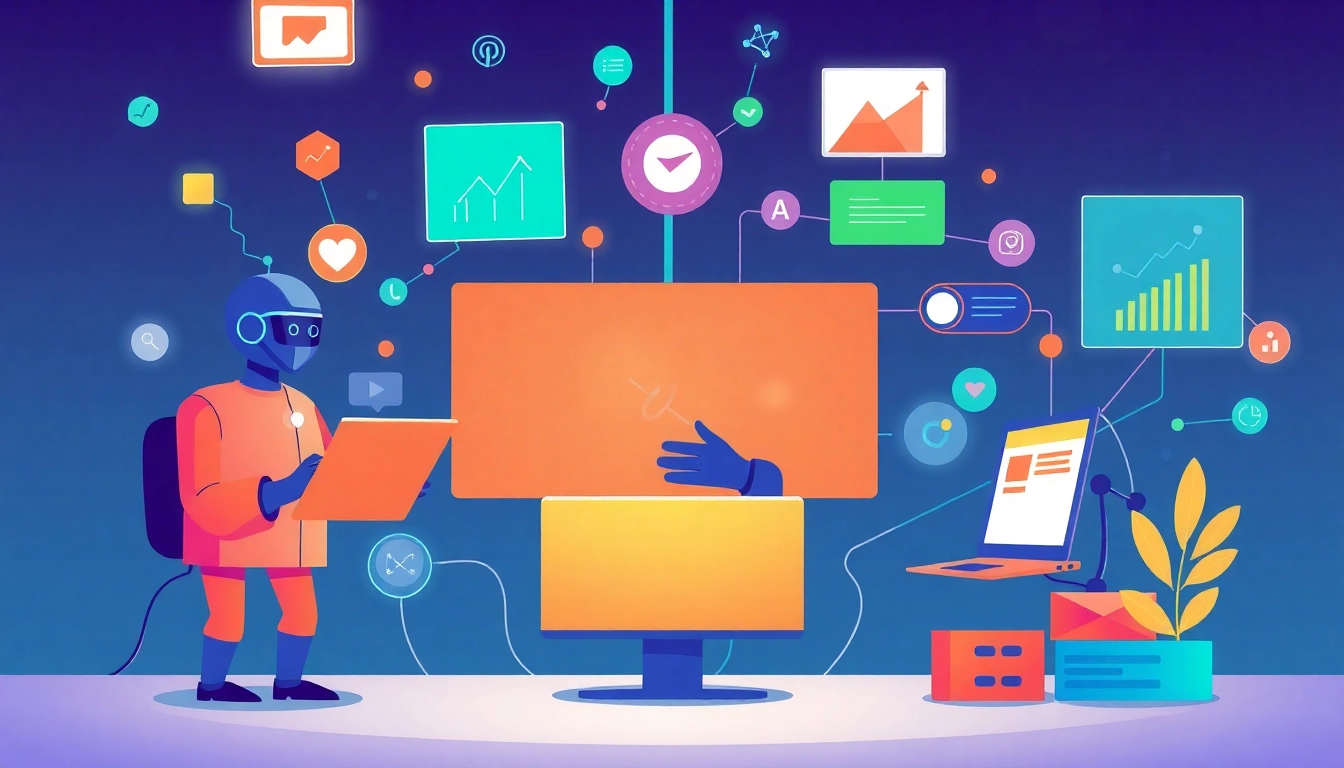Understanding AI Marketing Agents
In the rapidly evolving world of digital marketing, AI marketing agents have emerged as a prominent force, automating various marketing processes and enhancing overall efficiency. These cutting-edge tools leverage artificial intelligence to optimize marketing strategies, manage customer interactions, and analyze vast data sets, all while requiring human oversight to ensure they operate effectively within the company’s framework. This article delves deep into the concept of AI marketing agents, exploring their functionality, types, implementation strategies, and the future landscape of marketing.
What are AI Marketing Agents?
AI marketing agents are software applications or systems that utilize artificial intelligence technologies to facilitate and automate specific marketing tasks. These agents operate semi-autonomously, meaning they can carry out functions like customer segmentation, personalized content delivery, and campaign optimization without requiring constant human intervention. However, human oversight remains critical to guide these agents’ decision-making processes and ensure alignment with broader marketing goals.
How AI Marketing Agents Work
AI marketing agents function by employing a variety of AI techniques, including machine learning, natural language processing, and predictive analytics. For instance, a marketing agent might analyze customer data from various channels, including social media, email, and website interactions. Based on this data, the agent can generate insights that help marketers tailor campaigns to specific audience segments. Additionally, these agents are capable of learning from past performance, allowing them to refine their strategies over time continuously.
Benefits of Implementing AI Marketing Agents
The implementation of AI marketing agents offers numerous advantages for businesses:
- Increased Efficiency: By automating routine tasks, marketing teams can focus on strategic initiatives that require human creativity and oversight.
- Enhanced Personalization: AI agents can analyze consumer data in real-time, facilitating more personalized marketing experiences and improving customer engagement.
- Data-Driven Insights: These agents can sift through massive datasets to provide actionable insights, allowing marketers to make informed decisions based on real-time information.
- Cost Savings: While there may be an initial investment in AI technology, the reduction in manual labor and increased efficiency can lead to long-term cost savings.
Types of AI Marketing Agents
Automation Tools for Campaign Management
Automation tools are perhaps the most common type of AI marketing agents. They handle repetitive tasks such as scheduling social media posts, managing email marketing campaigns, and tracking advertising performance. Platforms like HubSpot and Marketo utilize AI algorithms to optimize the timing and content of communications based on audience behavior, enhancing engagement rates.
Data Analysis and Insights Generation
Another vital category of AI agents focuses on data analysis. These tools consolidate and analyze data from various sources to provide marketers with insights into customer behavior and campaign performance. For example, Google Analytics employs AI capabilities to offer predictive insights about potential future customer actions based on historical data trends. This type of insight can inform future marketing strategies significantly.
Personalization and Customer Engagement Strategies
AI marketing agents dedicated to personalization leverage machine learning algorithms to deliver tailored content and experiences to consumers. Companies like Netflix and Amazon use AI-driven recommendations based on individual user data to maximize user engagement and satisfaction. These personalization strategies are essential in differentiating a brand in an oversaturated market.
Choosing the Right AI Marketing Agent
Evaluating Your Business Needs
Before selecting an AI marketing agent, businesses must thoroughly assess their specific marketing goals and needs. Factors to consider include the scale of the marketing efforts, the complexity of the customer journey, and the existing technological infrastructure. A small business may require basic automation functionalities, while larger enterprises may benefit from comprehensive analytics and personalization capabilities.
Comparing Features and Pricing
With a variety of AI marketing tools available, comparing features and pricing is crucial. Features to analyze include integration capabilities with existing systems, ease of use, customization options, and the level of customer support offered. Pricing models can vary significantly, from subscription-based to one-time licensing fees, making it imperative for businesses to select a solution that aligns with their budget and future growth plans.
User Reviews and Case Studies
When evaluating potential AI marketing agents, it’s beneficial to look at user reviews and case studies. These insights can provide a clearer picture of the tool’s effectiveness in real-world scenarios. Successful case studies demonstrate how other companies have leveraged specific AI agents for notable improvements in customer engagement or campaign performance, thereby guiding businesses toward making informed choices.
Integrating AI Marketing Agents into Your Workflow
Implementation Steps and Best Practices
Implementing an AI marketing agent requires strategic planning. Key steps include:
- Identify marketing goals and objectives.
- Choose the right AI agent based on previously established criteria.
- Develop a clear integration plan outlining how the AI tool will fit into existing workflows.
- Provide necessary training for the marketing team to ensure proper usage and maximize the tool’s potential.
- Monitor performance metrics and gather feedback for ongoing optimization.
Training Your Team for AI Utilization
Sufficient training is crucial for success with AI marketing agents. Employees should understand how to leverage the tool effectively, interpreting AI-generated insights and making data-driven decisions. Continuous professional development through workshops and training sessions regarding AI technologies can help keep teams abreast of advancements and best practices.
Measuring Success and Performance Metrics
To validate the effectiveness of AI marketing agents, businesses should establish key performance indicators (KPIs) to track success. Common metrics to evaluate include:
- Engagement rates (click-through rates, conversion rates)
- Customer retention rates
- Return on investment (ROI) for marketing campaigns
- Efficiency improvements (time saved on manual processes)
Regularly reviewing these metrics helps organizations understand the impact of their AI initiatives and identify areas for further enhancement.
The Future of AI Marketing Agents
Emerging Trends in AI Technology
As AI technology continues to advance, several trends will shape the future of AI marketing agents:
- Increased Automation: Expect deeper integration of AI-driven automation in marketing processes, freeing up human resources for higher-level strategic tasks.
- Enhanced Personalization: Future AI agents will leverage advanced algorithms to offer hyper-personalized experiences tailored to individual consumer behavior and preferences.
- Integration with Other Technologies: AI marketing will increasingly work in tandem with emerging technologies such as augmented reality (AR) and virtual reality (VR), providing immersive customer experiences.
Potential Challenges and Ethical Considerations
While the future of AI marketing agents appears promising, potential challenges must be addressed. Issues related to data privacy, algorithmic bias, and the ethical use of AI will require careful consideration. Companies must prioritize transparency, ensuring that their AI practices adhere to legal standards and ethical norms, fostering trust with consumers.
How to Stay Ahead in Competitive Markets
To maintain a competitive edge, businesses need to stay informed about the latest AI trends and continuously adapt their marketing strategies. Utilizing AI marketing agents offers an opportunity to enhance operational efficiency and cultivate more significant customer relationships. Engaging with industry forums, attending webinars, and subscribing to relevant publications can provide valuable insights into advancements in AI technology and its impact on marketing.



